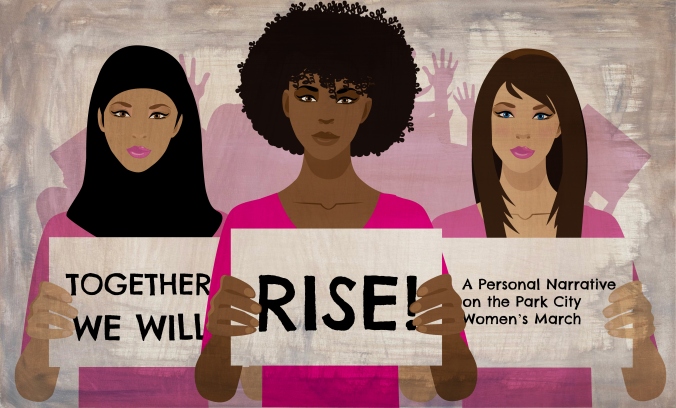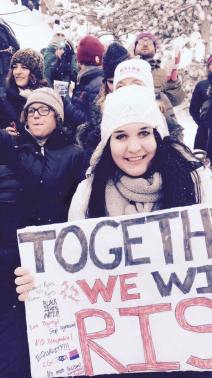by Amanda Steele

I woke up that morning at 6 a.m. Pulled on boots, layers of pants, scarves, gloves, and looked out the window to inches of fresh snow. A quick search online let me know that Parley’s Canyon would be treacherous in these conditions, and I wavered about whether or not to chance it. At risk of sounding melodramatic, it felt like a turning point for me. Was I going to turn back when things were difficult? Would snow and icy roads deter me from coming together with millions of women across the world to march for equality and rights for all people? The air seemed to buzz with a collective energy, and I knew I would regret it if I didn’t even try. Deciding that I could always turn back if the roads were too bad, I zipped up my coat and headed out the door, a makeshift sign that read “Together We Will Rise” in my hand.
The slow-crawling, barely-moving drive to Park City seemed a metaphor for the state of women’s, and other minority groups’, rights in our country. An uphill battle, slow moving, where little progress seemed to be made. Danger was also involved. Toyota Camrys, Dodge pickups, and Walmart semi-trucks dotted the side of the road as emergency vehicles came to their rescue. Traffic was heavy, and there was bodily risk for all of us—just as those with bodies outside the norm. The bodies of women, people of color, queer people, disabled people, DAPL protestors, etc. are at risk as things stand now in our country. Even more with the inauguration of Trump.
Nearly three hours later, I found a place to park amongst the thousands of people gathered for both the Sundance Film Festival and the Women’s March and grabbed a bus to Main Street where the march would begin. Hundreds of us jogged excitedly to the start of the march that was already beginning to make its way from the Wasatch Brewery. I had made it just in time.
The snow was still coming down in soft, large flakes as I joined the throng. Signs held aloft with phrases such as, “my body, my choice,” “how long must women wait for equality,” and my personal favorite “a woman’s place is in the resistance” among others. There were children, men, celebrities, locals, and lots of women and queer folk. Accompanying us was a peaceful but determined quality to the atmosphere.
The rally afterwards was overflowing into the streets. People climbed up onto snowbanks to get a better view over the sea of pink hats and cardboard signs that were now a bit droopy from all the snow. We were Queens in the North. Winter was here, and nothing was going to keep us from the fight. Despite the stress of getting here, I was happy I had made it. It is hard to describe knowing that you are surrounded by thousands of other people who care about equality just like you and knowing that millions of other women around the world were marching that same day. It truly did feel historic, and I am proud that I pushed through social anxiety, dangerous roads, and crowded buses to show my support.
For me, marching represents a personal commitment to put my words into actions. To become involved in my community and state government and organize with others in my area to create change. To agitate, to protest, to show up. I’ve always been the sort to focus my energy into writing, art, or changing the minds of those around me, and while those are important things, sometimes we all need to be willing to do more.
I was also made aware that even for all the positive aspects of the march there is much work to be done. I had the privilege of never feeling the necessity and urgency of showing up to a protest or march before Trump’s election. Many people have been showing up and fighting long before me because they had no choice. They have always been at risk. These marches were mainly centered on the issues of white women, and the chants could at times be too focused on a gender binary. We need to continue to recognize privilege and get out of the way for people of color, nonbinary people, and other groups that often get pushed aside so that white, cisgendered bodies are the most visible. I, and other white women, need to show up to marches for Black Lives Matter, need to speak up and say that vaginas don’t make a woman. As with all social movements, we need to be continually checking our privilege and critiquing ourselves. We need to celebrate our victories but keep striving to do better.
In the end, I came to the march because I decided enough is enough. It is time for all of us to call our congress people, show up to protests, organize together, and end complacency. For ourselves and even more so for others with less privilege than our own. When I look back on this weekend, one that will be talked about for years to come, I want to be remembered as someone who stood up. Someone who was willing to do hard things because they were the right things. Someone who didn’t sit complacently by and let others do the work for me. May we all continue fighting the good fight and be a little braver and bolder during the oncoming years. May we keep each other safe and keep showing up. If we do that, we can keep the tide of nationalist, bigoted beliefs at bay.

 Amanda Steele is a feminist killjoy and bisexual woman living in Sandy, UT. She is a recent graduate of Utah Valley University with a degree in creative writing and a gender studies minor. Amanda has been published in peculiar, along with multiple other Utah-based publications such as Touchstones, Rock Canyon Poets community publication, and Intersections along with online journals including wordhaus. In the past, she has served as an associate editor for Essais and prose editor for Touchstones, both student publications. She is currently applying to graduate school in gender studies and loves to mix her love of activism with her love of writing and fandom.
Amanda Steele is a feminist killjoy and bisexual woman living in Sandy, UT. She is a recent graduate of Utah Valley University with a degree in creative writing and a gender studies minor. Amanda has been published in peculiar, along with multiple other Utah-based publications such as Touchstones, Rock Canyon Poets community publication, and Intersections along with online journals including wordhaus. In the past, she has served as an associate editor for Essais and prose editor for Touchstones, both student publications. She is currently applying to graduate school in gender studies and loves to mix her love of activism with her love of writing and fandom.